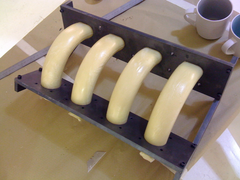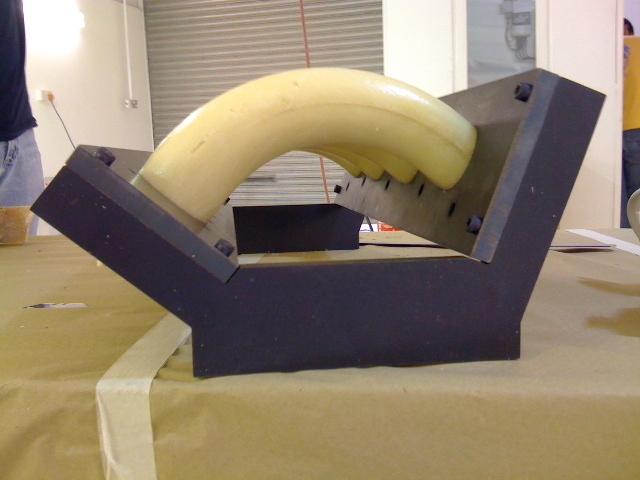

Rescued attachment IMG_0088.jpg

In my search for interesting questions to ask you guys and gals, I'm interested in this particular one because I see no reason why a custom inlet
manifold should not be fabricated with GRP, especially with epoxy.
On could carve the desired shape, ensuring a smooth transition from round carb or throttle body exit to (quite often) oval inlets onto a pattern made
from some suitable material, then lay it up with GRP.
Might be a good deal easier than fabricating it with aluminium etc
I'm aware that quite a few cars now (eg Mondeo duratec) use plastic inlet manifolds.
Any thoughts?
John
[Edited on 16/5/09 by mr henderson]
It bolts to your cylinder head and the water temperature in there can be over 100°C. The head itself will be hotter than the coolant. Yur choice of gasket would reduce the temperature transmitted to the plastic and the air flow will cool the manifold in use though not after the engine is switched off.
The inlet would be cooled by Fuel / air so shouldnt get too hot. As Smart51 said, the gasket would insulate the inlet from heat, though some would
be transferred via bolts as well. This could be overcome by felt / Nylon washers. I would suggest that GRP wouldnt be fuel resistant over aperiodof
time? the last thing you need is melted resin in your inlet....
Just my thoughts.
Maybe modification of a plastic / ABS inlet would be more suitable?
Later Zetecs use plastic manifolds and bikes use rubber connectors so it must be fairly cool.
[Edited on 16/5/09 by Peteff]
Quite a complex design to lay up though, not quite sure how you'd do it without using e.g. the "lost foam" process where you lay up GRP
over a foam core than can be dissolved in a suitable solvent.
Temperature is not the only issue, the material needs excellent resistance to fuel and oil at elevated temperatures as well. I know this has been
done using carbon/epoxy on competition cars, don't know if it would be suitable or cost effective for a road car though.
Have a look at the link below which details the design of a Phenolic spacer to stop heat transfer to the inlet manifold. Made from epoxy resign so its
all the the materials chosen really.
Phenolic spacer
quote:You need to bear in mind, as MikeRJ has said, that you need to be able to release the part from the male or female mould. If you picture a standard inlet manifold then you will understand that this could be a little difficult. Most of the one that I have seen in the past (mostly made by AIR) have used used epoxy/CF for the runners etc but have been bonded to an ally flange.
Originally posted by mr henderson
On could carve the desired shape, ensuring a smooth transition from round carb or throttle body exit to (quite often) oval inlets onto a pattern made from some suitable material, then lay it up with GRP.
[Edited on 16/5/09 by mr henderson]
My ally inlet manifold gets to hot to touch.
It transfers the heat from the head with great efficiency.
I like the idea of the Phenolic spacer any one got a lowcost solution???
Some inlets manifolds have a waterway to heat the manifold to stop carbs icing in cold weather .Engines like the Pinto, X flow etc have one whereas later injected engines like the Duratech may not have waterways and can get away with plastic manifolds. Then again the K series use plastic manifolds with a waterway but they cause problems . Might be better to look at ways to fabricate the manifold from ally and get it welded up?
yes , ive made these in GRP and bonded to an ally manifold flange using polyester resin .
All the BMW motorsport ones are like that - ive made some of them too .
http://homepage.ntlworld.com/mj.slater2/intake1.JPG
[Edited on 17/5/09 by Volvorsport]
I've used Phoenilic spacers on the inlet manifold of the RS4 and it certainly helps with the heat, to the point that without them you couldn't rest your hand on the inlet once the car had been running for a while and after fitting them the where almost cool to the touch. I would have thought this is more of an issue with Turbo cars rather than NA engines.
quote:
Originally posted by jeffw
I've used Phoenilic spacers on the inlet manifold of the RS4 and it certainly helps with the heat, to the point that without them you couldn't rest your hand on the inlet once the car had been running for a while and after fitting them the where almost cool to the touch. I would have thought this is more of an issue with Turbo cars rather than NA engines.
We did see an improvement on the road with the amount of air the car was taking in up 10g/s to 435g/s. This equates to 544BHP.
quote:
Originally posted by Volvorsport
yes , ive made these in GRP and bonded to an ally manifold flange using polyester resin .
quote:
Originally posted by MikeRJ
quote:
Originally posted by Volvorsport
yes , ive made these in GRP and bonded to an ally manifold flange using polyester resin .
Is that moulded in two halves and bonded together after?
[Edited on 17/5/09 by MikeRJ]
heres a jig we've just made for a customer to make GRP inlet manifolds from


Rescued attachment IMG_0088.jpg
here


Rescued attachment IMG_0090.jpg